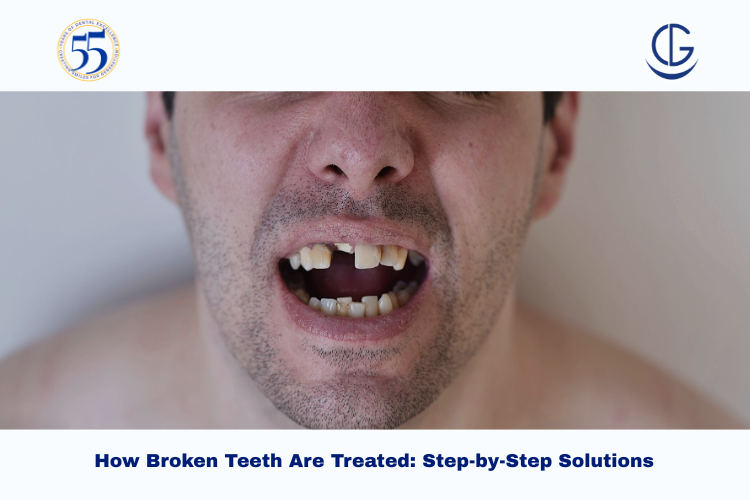Schedule Appointment



Looking for the best broken teeth treatment? Whether you’ve cracked a molar while chewing or chipped a front tooth during an accident, this guide will walk you through everything you need to know. At Dr. Gowds Dental Hospital, our specialists are ready to help you restore your smile quickly and safely with advanced treatment options tailored to your needs.
Broken teeth are a common dental issue that can happen to anyone—from biting into hard foods to sports injuries or unexpected falls. While some cases are minor and may only require cosmetic repair, others need immediate medical attention. Understanding your options and the steps involved in broken teeth treatment is crucial to prevent further complications like infection, pain, or tooth loss.
Before we explore how to fix broken teeth, it’s important to understand what causes them. Common reasons include:
No matter the cause, early detection and prompt treatment can prevent long-term issues.
Identifying the type of break can help determine the best broken teeth treatment:
A small piece of the enamel breaks off. This is usually painless unless the chip exposes the nerve.
A fracture that extends from the chewing surface downward. Cracks may be visible or hidden and can cause pain when chewing.
A cracked tooth left untreated may eventually split. This type often requires extensive treatment, sometimes extraction.
Typically occurs around a dental filling. These breaks don’t always affect the pulp but still require repair.
These can cause intense pain, swelling, and even abscess formation. They often need root canal treatment or tooth extraction.
If you break a tooth, rinse your mouth with warm water and apply a cold compress to reduce swelling. Save any broken fragments if possible.
Emergency dental care is critical if:
Dr. Gowds Dental Hospital offers 24/7 emergency care for urgent cases like these.
Step 2: Consultation and Diagnosis
Visit a qualified dentist immediately. At your appointment, the dentist will:
Early diagnosis ensures the most effective broken teeth treatment with minimal complications.
Step 3: Treatment Options Based on Severity
Depending on the severity, several tooth repair options are available:
Bonding uses a tooth-colored resin to fill in the chipped area.
Benefits:
Ideal for: Chipped tooth in the front or small enamel cracks.
2. Dental Veneers
Thin porcelain or composite shells cover the front of the tooth.
Benefits:
Ideal for: Cosmetic repairs on front teeth with chips or cracks.
3. Dental Crowns
Caps that cover and protect a damaged tooth.
Benefits:
Ideal for: Fractured cusps, large breaks, and after root canal treatments.
4. Root Canal Treatment
If the tooth pulp is damaged or infected, a root canal is necessary to save the tooth.
Benefits:
Ideal for: Deep cracks or breaks that reach the nerve.
Read our detailed guide on root canal treatment here ➝
5. Tooth Extraction and Implants
In cases where the tooth is beyond repair, extraction followed by a dental implant may be required.
Benefits:
Ideal for: Severely broken teeth with vertical root fractures.
Learn more about dental implants and restoration ➝
After receiving broken teeth treatment, follow these aftercare tips:
These habits will help your restored tooth last longer and prevent future issues.
Always consult a dental professional if you notice any of the following:
Delaying treatment can result in more complex and costly procedures later on.
At Dr. Gowds Dental Hospital, we offer a complete range of broken teeth treatment solutions—from cosmetic fixes to surgical interventions—with advanced technology and expert care.
Broken teeth treatment varies depending on the type and severity of the damage. Minor issues like chipped teeth can often be resolved with simple procedures like bonding or veneers. More serious cases may require crowns, root canals, or even implants.
To recap:
If you or a loved one is dealing with a broken tooth, don’t wait. Book an appointment at Dr. Gowds Dental Hospital for a personalized evaluation and the best treatment options.
Contact Dr. Gowds Dental Hospital for expert advice, same-day appointments, and customized broken teeth treatment plans. Whether it’s a minor chip or a major break, we’re here to restore your confidence and your smile.
If you break a tooth, rinse your mouth with warm water and apply a cold compress to lessen swelling. If possible, save any fragments of the tooth and seek emergency dental care as soon as you can. Taking fast action will allow for the best broken teeth treatment and reduce the risk of infection.
Yes, there are usually ways to restore a chipped tooth using dental bonding or veneers for smaller damage. These are common tooth restorations that can often be done quickly, cost effectively, and minimally invasively. Crowns are typically reserved for more severe damage.
Not always, a root canal will only be necessary if the fracture goes through the tooth’s pulp and is causing pain or infection. Minor fractures are treated with bonding or crowns. Your dentist will verify how bad the fracture is and their recommended broken teeth treatment.
The cost of broken teeth treatment in India is usually the type of treatment you may choose for the broken tooth. A small repair such as basic bonding would cost less than a dental crown or implant. Dr. Gowds Dental hospital will work with you to provide safe and affordable treatment based on your needs and budget.
A cracked tooth will not heal itself. It may be painless at first, but that does not mean it isn’t going to get worse. You will need to talk to a professional to repair the tooth. Professional treatment options include bonding, crowns or root canals to ensure you don’t encounter further issues. Be sure to ask your dentist to provide you with the appropriate treatment options if you’ve broken a tooth.